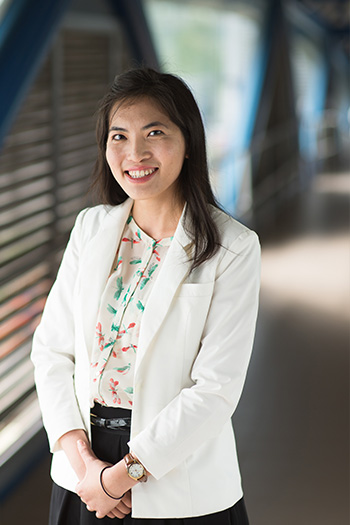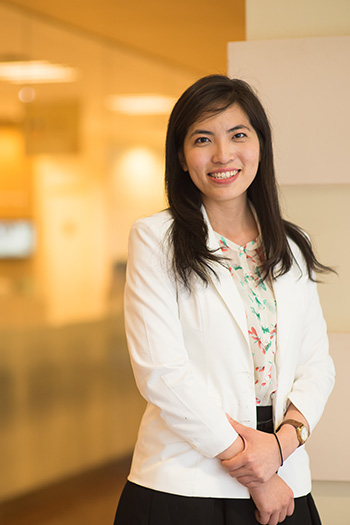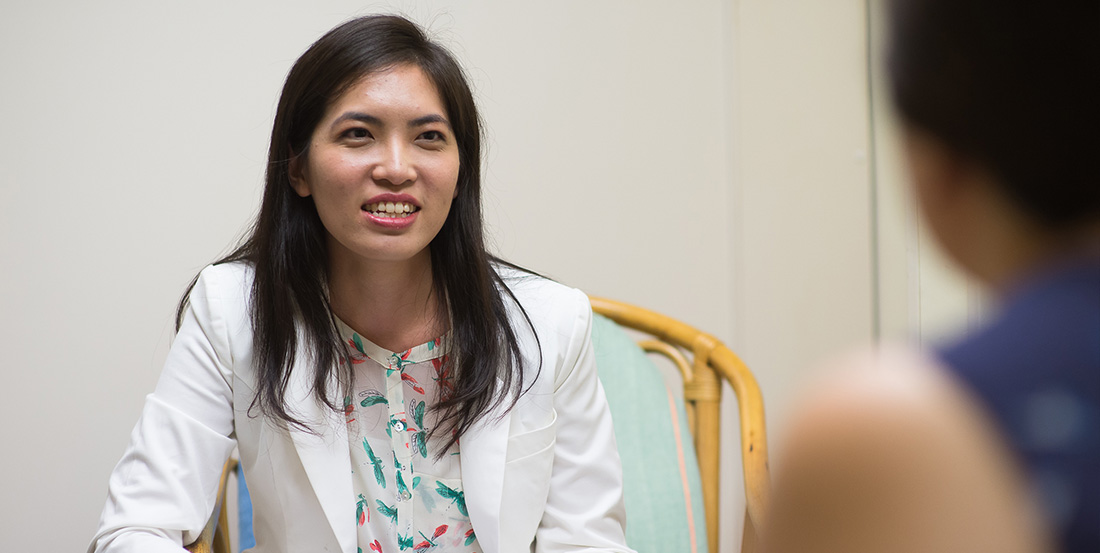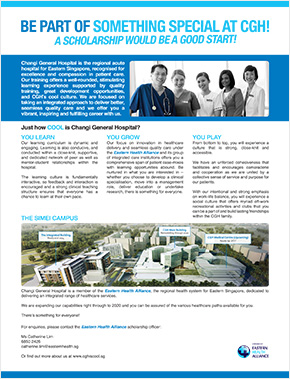F or Joyce Leong, her final-year project at the Nanyang Technological University’s Wee Kim Wee School of Communication and Information first got her thinking about becoming a Medical Social Worker (MSW). As she examined the psychosocial impacts of cancer on cancer survivors, she became increasingly intrigued by the area of medical social work.
She admits candidly, “I had not heard about medical social work until I came across it while working on my project. However, I have always wanted to work in the healthcare sector and was planning to work in corporate communications in a hospital. So when I was offered the Healthcare Scholarship, I immediately took it as it offered an avenue for me to pursue a whole new field of education in social work in the hospital setting that I wanted!”

Now a MSW at Changi General Hospital (CGH), Joyce takes us through the in’s and out’s of her job and the fulfilment she derives from it.
What are some of your roles and responsibilities as a MSW?
Joyce Leong: I help with the psychosocial needs of patients and families. This can take the form of offering practical help such as financial assistance with medical bills, equipment or medical devices and arranging for care services to be put in place. I also advocate on behalf of patients and negotiate with external agencies to help meet patients’ social needs such as employment and accommodation. I also help patients manage their interpersonal or family relationships and provide emotional and counselling support to them and their families throughout these stressful times. In addition, we work closely and collaborate with doctors, nurses and fellow allied health professionals to provide the best care to patients and families.
How else do you play a part in ensuring that each patient enjoys a smooth return to health?
Joyce: As MSWs, we try to address the psychosocial concerns and needs of patients and families, alleviate their anxieties and provide support, assistance or reassurances where necessary in their healthcare journey. It can be a very turbulent time for them and we try to support them as they navigate the healthcare system. For instance, we may help to liaise with MSWs from other restructured hospitals or polyclinics to help patients apply for the Medical Endowment Fund (Medifund) at the institution where they are due to have follow-up treatments or checkups. Good working relationships with colleagues from other healthcare institutions and organisations help to ensure that our patients’ healthcare journeys are as hassle-free as possible.
Furthermore, families are often at a loss as to what to expect when a family member gets admitted. We step in to help patients and their families understand what might be needed for the patient’s post-discharge care by informing them of what to expect and facilitating a better understanding of the situation. I make an effort to listen to and understand their perspectives and decisions. In some cases, it is about providing them with more information about the care options and services available so that they can make informed decisions about the patient’s own care. The important thing for us to remember in the course of our work is that patients ultimately have the right to take charge of their own lives and we are to respect and support them and their decisions wherever possible.

Joyce Leong Yeng Ling
Healthcare Scholar
Designation: Medical Social Worker,
Changi General Hospital
Studied: Master of Social Work,
University of Melbourne, Australia
Bachelor of Communication Studies,
Nanyang Technological University
What are some of the challenges you have faced at work and how have you overcome them?
Joyce: We are sometimes faced with complex family dynamics where relationships are strained and I am unable to engage families productively to support them in caring for the patient. Furthermore, it can be a challenge to manage patients’ expectations while juggling the amount of resources that can be made available to them.
The complexities of social issues are intricately connected to my patients’ healthcare needs. To add on, there are other systemic obstacles such as the availability of resources and the challenge of deploying them in a timely manner that can pose a hindrance to my work. Fortunately for me, I have the support of a dedicated, multi-disciplinary team and seniors to help me cope with and overcome these challenges and pressures. And in order to consistently provide a high level of care to my patients, I learn to be more creative in coming up with solutions to work around constraints.
What do you hope to achieve as a MSW at CGH, a partner of the Eastern Health Alliance?
Joyce: I hope to be able to accumulate experience and practical skills in specialised areas of work such as mental health and trauma. I want to be more skilled and effective at supporting the individual and family in their environment regardless of the context of their illness.
CGH adopts a vision that emphasises empathy and the delivery of person-centred care. This is highly compatible with the values that govern social work, such as autonomy, compassion and respect for our patients. Furthermore, this overarching vision effectively empowers me as a worker to practise according to my professional values.
What advice do you have for aspiring Healthcare Scholars?
Joyce: It would be helpful to have a desire to serve Singapore and shape the healthcare sector for the better. In addition, it would be good if you are able to view the vocation as something that is more than a job – it is really a calling that gives more meaning, purpose and longevity to everything we do.
On a more personal level, I think it is important to hold on firmly to the values of compassion and empathy and be able to call to mind the motivation or drive that set you on this path in the first place. We definitely need this to remain effective as a healthcare service provider.
To cap it all off, it is also immensely beneficial to keep in mind a broader view of the healthcare landscape in Singapore because it will help you appreciate your daily work on the ground and make it more meaningful.

